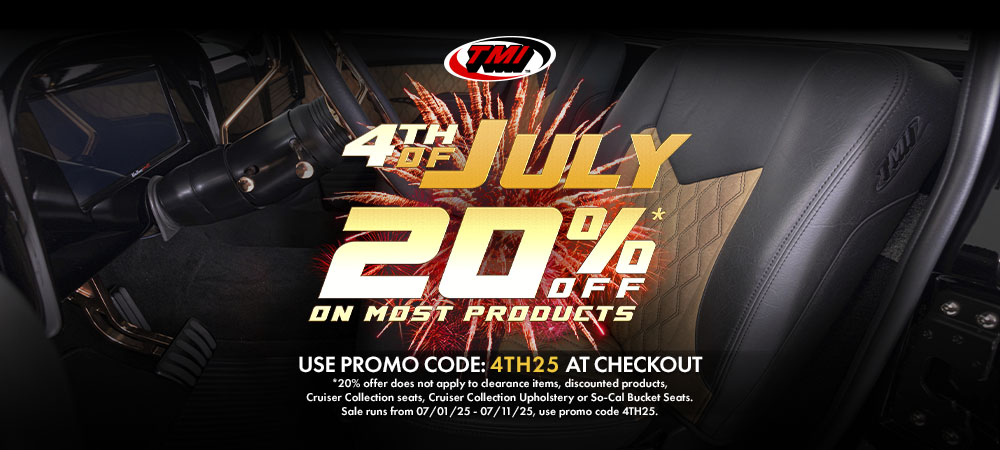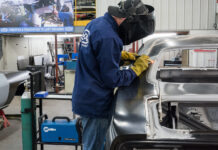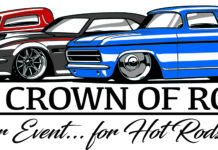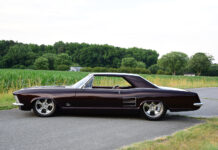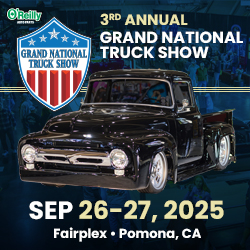Is a Gen III a real Hemi? A classic hot rod with modern EFI power.
By Brian Brennan – Photography By Wes Allison
If you have followed Modern Rodding from our early days, then you may remember the build story on this ’32 Ford three-window highboy coupe back in our May ’21 issue. Bruce Fortie of Texas still owns it, and the Veazie Brothers Fabrication shop in Pomona, California, completed the build. The time has come as the hot rod is finished and racking up miles of smiles.

Read More: Red-Ram Hemi Vs. 5.7L Hemi – Identical ’32 Ford Builds
We will get to the particulars of this build covering the body and the chassis, but it’s the engine that’s an interesting conversation. The late-model, Gen III Chrysler Hemi is by no means a stranger to hot rodders, although there aren’t, relatively speaking, many of them currently showing up at events.

When looking at this Deuce, there is no denying the V8 is impressive. That’s what Hemis do. It’s a hot rod motor with its Borla 35mm air horn kit and the Veazie Brothers’ modified Gen III 16-plug valve covers with Mooneyes breathers. Note the coil packs, once on the valve covers, are relocated beneath the center valley cover.
Read More: Blown Hemi-Powered Plymouth Coupe Transformation
Chrysler Hemi History
A little background on the Chrysler Hemi. Gen I began in 1951 (FirePower V-8) and ran through 1958, while Gen II Hemi covers 1964-71, and Gen III began in 2003 and runs currently. All the cylinder heads used on these motors have true hemispherical combustion chambers. Now comes a more “liberal” use of the term hemispherical going forward with the modern Hemi. (Once again, the marketing department has taken liberties.)

Gen III Hemi
As it turns out, the modern Gen III Chrysler Hemi engine uses two spark plugs per cylinder, hence a 16 spark plug V-8. Just what you see in Fortie’s ’32 Ford three-window highboy coupe. This design began in 2003 going forward and in the Gen III 5.7- and 6.2L Hellcat V8.

Why the two spark plugs per cylinder? Provides for a faster burn by starting combustion on either side of the cylinder and burns toward the center. A faster burn is key to more power and lower emissions. The latest Gen III Hemi cylinder heads are much more efficient than the earlier head design.
Check Out: Hemi Swapped 1932 Ford Roadster
It should be noted that these modern Gen III Hemis do not possess true hemispherical-shaped combustion chambers like the early versions do. Instead, the Gen III Hemi V8s are semi-hemispherical with canted opposing valves with large quench pads located at the sides of the chamber. So, in truth, this V-8 isn’t like in the old days but is a Hemi based on the modern use of the term. Go figure.

The ’32 coupe is powered by a 392-inch Gen III Hemi that uses an iron block and aluminum heads. It features a Scat crank and pistons, along with a Comp Cams ’stick. Lots of ARP hardware is used to hold this 495hp (at the rear wheels) hot rod V-8 together. The fuel pump is Holley, as is the water pump and alternator, along with a SPAL electric fan and a Walker radiator.

The ECU is based on a Holley Terminator X system, along with a Powermaster starter and an Odyssey battery. The headers are custom full-length by REF Unlimited, while the Veazie Brothers bent the exhaust tubing from the headers through a pair of Boral stainless mufflers and then out the back. The potent V8 is then backed up to a TREMEC TKO five-speed run through the gears via a Hurst shifter. McLeod flywheel, pressure plate, and clutch are used.

SO-CAL Speed Shop ’32 Ford Chassis
The chassis is based on a set of American Stamping framerails with the nose featuring a SO-CAL Speed Shop “pinch” common to what is used on a fenderless hot rod. The front axle is a 47-inch-wide (highboy pinch); 4-inch drop, drilled, narrowed, and plated I-beam with SO-CAL ’37-41 Ford-style spindles, chrome tube shocks, and reversed-eye spring with insert buttons.

Centering the axle is a set of SO-CAL polished stainless steel hairpins, lower shock mounts, and batwings. The front brake system is a pair of polished and plated finned Buick brake drums that hide the Wilwood Dynalite caliper and vented rotor package.
A Borgeson Vega-style steering box is used along with a LimeWorks hot rod–style column. In the back, a John’s Industries narrowed Ford 9-inch rearend with 3.73 gears, Dutchman 31-spline axles, and drum brakes are used. Centering and mounting the rearend requires the use of a SO-CAL ladder bar, buggy spring setup, and chrome tube shocks. The wheel and tire combination is based on SO-CAL Speed Shop knock-off wheels measuring 16×5.5 in front and 16×8 in back, all are wrapped in Excelsior/Coker rubber, measuring 5.50R16 in front and 7.50R16 in back.

Brookville Roadster ’32 Ford Three-Window Coupe Body
The body is a Brookville Roadster recreation of the ’32 Ford three-window coupe. From here, the Veazie Brothers chopped the ‘32 Ford body 2 inches and then added a Rootlieb four-panel hood with custom “blisters” on the side panels to account for the Gen III Hemi valve covers. The louver handiwork comes by way of Shine Speed Shop, while the flat firewall is another Brookville item.

The headlight bar fitted with ’32 headlights is another SO-CAL item that also houses the upper shock mounts. In the back, a pair of ’32 taillights and SO-CAL factory stands are used. All final fitment (gaps) were handled at the Veazie Brothers shop. Once the hammering and banging were complete it was off to Cypress Auto Body for Tom Rodriguez to perform his magic and get the body ready for paint. Once done, he painted the car in British Racing Green, like what would be found on a Jaguar.

Inside, the body is fitted with a modified ’32 Ford dash that now houses Stewart-Warner gauges along with a LimeWorks steering column and a ’40 Ford wheel. Another creature comfort is the Vintage Air A/C; this, plus all other wirings, was handled by an American Autowire kit installed at the Veazie Brothers. The Glide bench seat, doors, and kick panels are covered in Crest leather in a saddle tan color along with brown square-weave carpeting. The headliner is the water-resistant Alcantara, and all the stitchwork was expertly achieved by Ron Mangus and crew at Ron Mangus Hot Rod Interiors.

There you have it … anytime a hot rod is Hemi powered that’s all that needs to be said. In this case, maybe it isn’t a Hemi but it sure looks the part and has the heritage to pull it off. MR
Click on this issue’s cover to see the enhanced digital version of When’s a Hemi Not a Hemi?.














